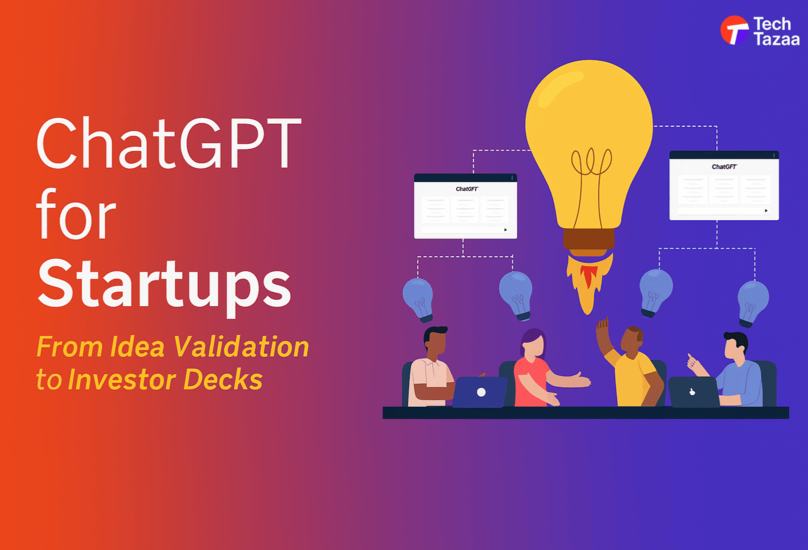The advent of artificial intelligence has transformed how to build, validate, and fund startups—and ChatGPT for startups sits at the heart of this transformation. Early-stage founders are now using ChatGPT to produce to brainstorm business ideas, conduct market analysis, write business plans, and develop investor decks—all in a small fraction of the time and cost it used to take.
In this practical guide, you’ll see how to use ChatGPT for startups at every stage of your journey — from validating your first idea to building a strong investor pitch deck that stands out. Drawing from years of startup experience, this guide shows how founders can use AI as a tireless co-founder that helps refine ideas, create strategy, and craft investor-ready presentations. Whether you’re a solo founder, part of a small team, or preparing to raise your first round, this article will help you understand how ChatGPT for startups can save time, reduce guesswork, and give you an edge in your startup’s early growth.

Image Source – Gemini
Why ChatGPT Is a Game-Changer for Early-Stage Founders
Building a startup is fast-paced and uncertain. Founders often juggle idea testing, market research, and investor preparation all at once. That’s where ChatGPT shines.
1. Speed and Cost Efficiency
ChatGPT can save you weeks worth of work. It can draft content, recommend features, assess competitors, and help you refine your value proposition in a matter of minutes. This gives founders the option of leveraging ChatGPT as an economical brainstorming and content partner rather than hiring multiple freelancers early on.
2. Clear Thinking and Idea Expansion
By asking structured questions, ChatGPT helps founders think more clearly about their customers and problems. For example:
- “What are the top 5 pain points faced by small e-commerce sellers?”
- “Who are my top 3 competitors, and what are their pricing strategies?”
These prompts quickly generate ideas you can verify through market feedback.
3. Scalable Support
As your startup grows, ChatGPT can help with everything from product descriptions to investor communication—making it a powerful ongoing tool, not just a launch companion.
Validating Your Startup Idea with ChatGPT
Before spending months building something, validation is key. ChatGPT helps founders test ideas, identify market gaps, and understand audiences faster.
How to Use ChatGPT for Market Research and Competitor Analysis
You can ask ChatGPT to:
- List competitors targeting your niche.
- Summarize customer reviews to identify unmet needs.
- Generate questions for user interviews.
For example:
“List 5 direct competitors for a SaaS tool that automates LinkedIn lead generation. Summarize their pricing models and positioning.”
ChatGPT will return data you can cross-check with Google and LinkedIn, saving you hours of manual research.
ChatGPT Prompts for Startup Idea Validation
- “Describe the problem this product solves for users.”
- “Who is the ideal customer for this startup idea?”
- “What objections might customers have?”
By testing these prompts, you’ll quickly know whether your idea solves a real problem or needs refinement.
Using ChatGPT to Create a Winning Business Model and Strategy
Once you’ve validated your idea, it’s time to build a plan. ChatGPT helps turn raw ideas into clear, structured business models.
Generate Your Startup Business Plan with ChatGPT
You can prompt ChatGPT to build your plan in minutes:
“Create a simple business plan for a B2B SaaS platform that helps agencies automate reporting.”
It can generate sections like market overview, customer segments, revenue model, and marketing plan. You can then refine each section with real data.
ChatGPT Prompts for Creating a Go-To-Market Strategy
Use ChatGPT to outline:
- Your distribution channels (social media, partnerships, referrals)
- Target audience segments
- Launch content calendar
Prompt example:
“Suggest a go-to-market strategy for a productivity app targeting remote teams.”
This gives you a roadmap you can test in the real world.
From Prototype to Pitch: Using ChatGPT to Build Investor-Ready Decks
Once your business model is set, your next goal is to communicate it effectively to investors. ChatGPT can help structure, write, and refine your pitch deck.
ChatGPT Prompts for Writing Your Investor Pitch Deck
Ask ChatGPT to create:
- A compelling problem-solution slide
- A traction and growth plan
- A financial projection overview
Example prompt:
“Write a slide outline for an investor pitch deck for a subscription-based AI writing assistant.”
It will return a professional layout covering vision, problem, solution, product, business model, team, and traction.
How ChatGPT Can Help You Refine Your Startup Narrative
You can also ask ChatGPT to rewrite your startup story for clarity or persuasion. For instance:
“Rewrite this founder story to sound confident and inspiring for investors.”
This helps you maintain consistency across your website, investor emails, and presentations.
Advanced Use Cases: ChatGPT for Growth, Funding, and Operations
ChatGPT’s capabilities go beyond validation and pitching—it can help you run and scale your startup.
1. Growth and Marketing
Use ChatGPT to generate social media ideas, blog outlines, or ad copy variations.
Prompt:
“Write 3 Facebook ad headlines for a startup that helps freelancers manage invoices.”
2. Funding and Investor Outreach
ChatGPT can draft outreach emails, follow-ups, and even simulate Q&A sessions before your investor meetings.
Prompt:
“Write a cold email to an angel investor introducing my startup in 100 words.”
3. Operations and Automation
Combine ChatGPT with Notion, Zapier, or Airtable to automate tasks—like generating meeting summaries or customer follow-ups automatically.
Best ChatGPT Prompts for Startup Founders
Here are useful prompts organized by stage:
Idea Stage
- “Generate 5 SaaS business ideas targeting small businesses.”
- “What are trending problems in remote work startups?”
Planning Stage
- “Create a pricing strategy for a subscription app.”
- “Summarize key metrics to include in a startup dashboard.”
Pitching Stage
- “Write a 2-minute elevator pitch for a B2B AI tool.”
- “Draft an investor email introducing my startup.”
Growth Stage
- “Generate content ideas for my startup’s LinkedIn page.”
- “Suggest 10 outreach messages for potential beta users.”
Common Mistakes Founders Make When Using ChatGPT
While ChatGPT can save time, it’s not a replacement for real-world validation.
- Skipping Real Customer Feedback – AI-generated data can guide you, but decisions should be grounded in actual user responses.
- Accepting AI Responses at Face Value – Always cross-check facts, stats, and financial projections. ChatGPT can help generate drafts, not verified data.
- Overusing AI for Creative Work – It’s easy to lose originality if you rely entirely on ChatGPT. Use it as a thought partner, not a replacement for your vision.
FAQs: ChatGPT for Startups
- Can I use ChatGPT to start a business?
Yes. Many founders use ChatGPT to generate startup ideas, test viability, and even plan operations.
- How accurate is ChatGPT for market research?
It’s great for initial direction, but always validate with real data from Google, Reddit, or customer interviews.
- Can ChatGPT make a pitch deck?
Yes, it can create a detailed outline, write slide content, and suggest design elements.
- Is ChatGPT useful for non-technical founders?
Absolutely. It’s like having a marketing, finance, and product consultant available 24/7.
- Can ChatGPT write business plans?
Yes—it can generate frameworks and fill them out based on your inputs, which you can then refine.
Conclusion: Build, Validate, and Pitch Faster with ChatGPT
From idea validation to investor presentations, “ChatGPT for startups” is one of the most practical tools founders have available to them today. It gets you moving quickly, thinking strategically, communicating clearly, and most importantly, you don’t have to wait for your team to be operational to get started.
Try out ChatGpt today to validate your next idea, write your pitch, and help organize your launch.
If this was useful, share it with another founder or save it for your next planning session.


